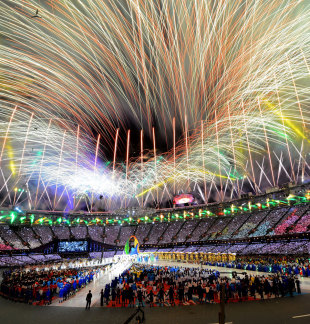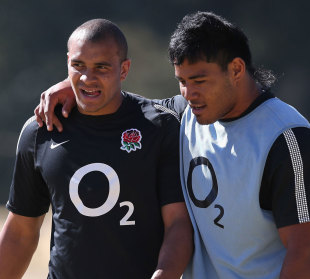|
Scrum Sevens
The Olympic benchmark
Tom Hamilton
August 23, 2012

The 2012 London Olympics was a huge success
© Getty Images
Enlarge
With the dust still settling on the immensely popular London Olympics, the preparations for one of the next big sporting events to be held in England are already well underway. Rugby World Cup 2015 is drawing closer and the pressure will be on the organisers to deliver a memorable tournament. With this in mind, this week's Scrum Sevens looks at a selection of areas where England 2015 (ER2015) - the body responsible for delivering the tournament - will hope to excel. Packing out the stadiums One early criticism of the Olympics was the empty seats across the various venues. With the clamour for tickets a constant presence in the press in the run up to the competition, the sight of many empty seats - in prime positions - caused uproar. LOCOG sensibly released more online but such is the nature of the Olympics that there will always be some people keen on seeing table tennis or double-trap shooting for example. A game played between two minnows at some far flung rugby league stronghold may struggle to draw the crowds so ER2015 need to get a solid plan in place to make sure that every game is played in a vibrant and passionate atmosphere. They should also be mindful that the lowest attendance during the 2011 World Cup was 10,100 for Fiji's win over Namibia. Getting the transport working It was something that Londoners feared before the Olympics - the whole city's transport system grinding to a halt with the influx of supporters maxing out the tube or the buses. But it all seemed to work relatively well. There were the odd stories of the Central line crashing on the first day of the athletics in the Olympic Stadium and perhaps two-hour long queues at the completion of a day's action, but this was manageable. The high standard of sport on show seemed to pacify any ill-feeling that was present before the games and credit to the transport system, it seemed to survive. With rugby being taken all over the country in 2015, the organisers will need buses, boats, trains and cable cars to all be singing off the same hymn sheet. Solid infrastructure There are currently 16 staff employed by ER2015 but they will need to expand this substantially ahead of the tournament. The breakdown of the 200,000 strong workforce behind the Olympics saw, among others: 6,000 staff, 70,000 volunteers and 100,000 contractors contributing to the effort. The organisers want to recruit 6,000 volunteers for the 2015 tournament and it was that area of the workforce that drew huge praise from the Olympics. Regardless of any issues which came their way, they were said to be helpful and above all, jovial. ER2015 needs to replicate this. The 2011 World Cup drew similar praise for their network of people working at the tournament so this must be a priority. Fan Camps The 'Cloud' in Auckland was well received during the 2011 World Cup and the Olympics had their own strongholds stationed all over London for people to take in the games. Big screens were erected throughout the capital with the focal point being Hyde Park. Most countries had their own 'house', with Ireland and Jamaica's proving particularly popular. This same sort of concept needs to be present in three years time. Imagine supporters of all nations packed into Greenwich's O2 Arena taking in New Zealand v Wales on the big screen...it would be quite something. The organisers must find a way to keep the whole country engaged for six weeks with the Olympics, in contrast, only lasting two. Training Bases Following Usain Bolt's 200m and 4x100m triumphs, he paid tribute to the people of Birmingham for all their support during their stay in the run up to the Games. The Jamaicans were based there and Birmingham now hopes to cash in on the 'Bolt effect'. Cash flow matters aside, it was great to see the Olympians dispersed throughout the country.. Areas from Yorkshire to Northern Ireland and from the south west of England to Scotland all hosted athletes to give the Games a truly national appeal. This worked well during the 2011 showpiece with the teams dispersed throughout New Zealand.

Could Manu Tuilagi or Jonathan Joseph be one of the faces of the 2015 World Cup?
© Getty Images
Enlarge
Choosing the face carefully Jessica Ennis was the poster girl of the 2012 Olympics and there were worries that the pressure may distract her from her charge for gold. But she thrived on the expectation and was the darling of the nation when she took top place on the podium in the heptathlon. Other faces which appeared on the sides of buses included Sir Chris Hoy, Mo Farah, Tom Daley and the less successful Phillips Idowu. Ahead of 2015, the organisers need to pick their personalities carefully. Do they opt for the tried and tested Jonny Wilkinson-esque persona or perhaps gamble on a potential star? It is a big decision and one which needs to be made carefully. Successful home nations A haul of 29 gold, 17 silver and 19 bronze medals was a solid return for Team GB on their home turf while Katie Taylor's triumph in the boxing sparked huge celebrations in Ireland. ER2015 need England to do well in three years' time. Wales are playing some of their matches on home turf while interest in the other home nations will be bigger than ever. To keep the whole country entertained for the six-week duration is a big ask but England, Wales, Scotland and Ireland performing well will certainly help. Imagine what would have happened had New Zealand lost to Argentina in the quarter-finals of the 2011 World Cup? The country would have gone into lockdown. ER2015 need England in the semi-finals at least. © ESPN Sports Media Ltd. Tom Hamilton is the Assistant Editor of ESPNscrum.
|
Live Sports
Communication error please reload the page.
-
Football
-
Cricket
-
Rugby
-
- Days
- Hrs
- Mins
- Secs
F1 - Abu Dhabi GP
Abu Dhabi Grand Prix December 11-131. Max Verstappen ()
2. Valtteri Bottas (Mercedes)
3. Lewis Hamilton (Mercedes)
4. Alexander Albon ()
5. Lando Norris ()
6. Carlos Sainz Jr ()
-
ESPNOtherLive >>
Darts - Premier League
Golf - Houston Open
Snooker - China Open
Tennis - Miami Open

